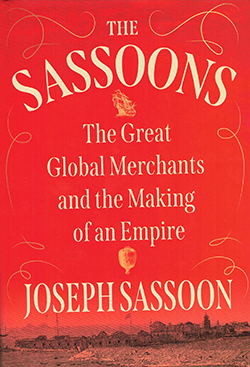 The Sassoons: The Great Global Merchants and the Making of an Empire by Joseph Sassoon; New York: Pantheon Books, a division of Penguin Random House © 2022; ISBN 9780593-316597; 412 pages including notes, bibliography, illustration credits, and index, $35.
The Sassoons: The Great Global Merchants and the Making of an Empire by Joseph Sassoon; New York: Pantheon Books, a division of Penguin Random House © 2022; ISBN 9780593-316597; 412 pages including notes, bibliography, illustration credits, and index, $35.
 SAN DIEGO – This family biography traces the Sassoon family from its 19th century roots in Baghdad and its migration to Bombay, where it developed into an important merchant family specializing in such commodities as opium, textiles, and oil. The family also had banking operations in various cities, real estate holdings in China and other parts of Asia, and an international customer base centered in England.
SAN DIEGO – This family biography traces the Sassoon family from its 19th century roots in Baghdad and its migration to Bombay, where it developed into an important merchant family specializing in such commodities as opium, textiles, and oil. The family also had banking operations in various cities, real estate holdings in China and other parts of Asia, and an international customer base centered in England.
Author Joseph Sassoon meticulously traces how previous generations of his family acquired tremendous wealth and how by the fourth generation they had squandered much of it. Along the way the family firm split into two rival concerns – the original David Sassoon & Co., and the breakaway E.D. Sassoon & Co., which through decades of competition nevertheless maintained a familial respect for each other.
Once a taxed and government-supported, legal product, opium appropriately became a banned substance in many countries, eliminating one of the Sassoons’ profit centers. Textile mills which spun out cotton clothing in India were the subjects of labor unrest in India, limiting another source of income. But the Sassoons were able to reorient themselves to other opportunities, including petroleum products, shipping, hotels, and real estate development.
Into their Sephardic families were born the English poet Siegfried Sassoon, who was raised as a Christian, and the businessman/ statesman Sir Victor Sassoon, who made the mistake of relocating headquarters of the family business from Bombay to Shanghai. In the late 1940s, much of the company’s real estate investments were confiscated after Communists under Mao Tse-Tung (now referred to as Mao Zedung) won control of mainland China.
The sons of founder David Sassoon had located themselves in different cities, forming an Asian trading empire that often was compared to the Rothschild business empire in Europe. Disagreements between two of the sons led to the split, but even more disastrous to the Houses of Sassoons was the desire of some members of the extended family to assimilate into English high society. They were befriended by the Prince of Wales (who later became king), were great collectors of art, ancient manuscripts, and horses, intermarried with prominent non-Jewish families, and spent fortunes entertaining the British aristocracy. In return, some received titles, election to Parliament, and their names filled the Society pages. But the business that had generated their wealth suffered greatly from their inattention.
While other Baghdadi mercantile families like the Hardoons and the Kadoories economically survived World War II and its aftermath, as various parts of the British Empire moved toward independence, the unmotivated Sassoon descendants, too preoccupied or snobbish to put in the necessary work, allowed the family business to slip into oblivion.
Over the 140 years that the family was an active business force, it participated in many philanthropies, the residuals of which are still in evidence today. I remember being impressed on a visit to Mumbai (as Bombay is now called) by the “The Gateway to India” structure which the Sassoon family initiated in 1912 to honor the previous year’s visit to India of King George V and Queen Mary. Another landmark is the gothic David Sassoon Library and Reading Room that was built in 1847 by the same family. David Sassoon’s mansion, once called “Sans Souci” (Without Worry) was converted to the highly-regarded Masina Hospital of Mumbai. Orphanages, boys’ reformatories, and schools also bear the Sassoon name. Numerous Jewish institutions in Mumbai, Shanghai, and several cities in England received generous contributions from Sassoon family members.
Relevant documents written in many languages were located in archives around the world. Author Joseph Sassoon deserves a lot of credit for assimilating so many of them into a comprehensive and quite readable account of what was one of the world’s great mercantile families.
*
Donald H. Harrison is editor emeritus of San Diego Jewish World. He may be contacted via donald.harrison@sdjewishworld.com